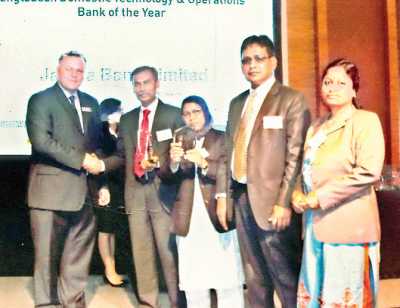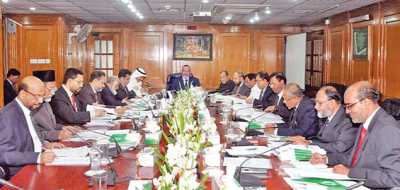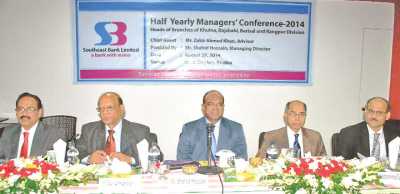Banking
BB brings cheer to foreign investors
Non-resident investors will now get higher returns from sales of shares in local firms as central bank relaxes rules
Foreign investors having stakes in Bangladeshi private companies will now get higher returns if they sell their shares, as the central bank has introduced globally-accepted approaches to value such firms.
Analysts say the move will encourage overseas investment in local companies.
Along with the currently practised 'net asset value approach' for determining the repatriable value of shares, Bangladesh Bank has adopted two more methods: market value approach and income approach or discounted cash flow approach.
Take an illustrative example under the three methods: If the price of a company's share stands at Tk 50 based on net asset value, it could be valued at Tk 100 in market value and Tk 200 in the income approach.
The BB will accept any of the three approaches or an average of the three in valuing the shares, depending on the nature of the company, it said in a notice yesterday.
“This is an important change which will contribute to a rise in foreign investment via the private equity channel as we have adopted global best-practised valuation methods,” said Hassan Zaman, chief economist of the central bank.
It is part of the process of prudently liberalising the foreign exchange regime and the access to equity capital will lead to companies expanding and creating jobs, he added.
Another BB official said the previous method is conservative and allows foreign investors to repatriate a small amount of their investments in Bangladeshi private companies.
Under the old system, overseas investors could not repatriate the true value of a company, he said.
Net asset value is estimated by deducting all liabilities of a company from its total assets. It is a conservative valuation, which does not take into account the future potential of a company.
However, the method can be used in certain cases, for example, when a company is not currently operating. The market value approach is mostly based on the price earnings (PE) ratio, which is a company's market price per share divided by its earnings per share (EPS).
The PE ratio provides an indication of how much investors are willing to pay for a company's earnings. For example, 15 PE ratio of a company means investors or buyers are ready to pay 15 times higher than the company's EPS to get a share.
Valuation of unlisted companies in the income approach or discounted cash flow approach is highly sensitive to assumptions of future cash flows. In practice, the method is not used in isolation and used as one of the drivers to determine the final price, the BB said. The income approach is primarily driven by three key inputs such as free cash flow, terminal value and discount rate.
Application for repatriation of sale proceeds of shares will have to be submitted to the foreign exchange investment department of the central bank with a valuation certificate, issued by a merchant bank or a chartered accountant.
The valuation certificates will have to be supported by full explanation justifying the fair value. Audited financial statements of the company will also have to be submitted along with the application for remittance approval, the BB said.
The central bank, however, can scrutinise the valuation by another chartered accountant, if it is not satisfied about the appropriateness of the valuation of shares, the notice added.
News:The Daily Star/1-Sep-2014Janata Bank gets Asian Banking, Finance Award

Janata Bank Limited was honoured with the ‘Asian Banking & Finance Award 2014’ by Asian Banking & Finance Magazine, a Singapore-based magazine.
Tim Charlton, Editor in Chief, Asian Banking & Finance recently handed over the award to Md Abul Monsur, Deputy General Manager of Janata Bank, said a press release.
Janata Bank is the only bank of Bangladesh that has achieved this rarely gotten prestige by becoming the Bangladesh Domestic Trade Finance Bank of the Year and the Bangladesh Domestic Technology and Operations Bank of the Year.
Islami Bank holds board meeting

Prof. Abu Nasser Muhammad Abduz Zaher, Chairman of the Board of Directors of Islami Bank Bangladesh Limited, presides over a meeting of Board of Directors of the bank at Islami Bank Tower in Dhaka on Sunday.
A meeting of the Board of Directors of Islami Bank Bangladesh Limited was held at the Islami Bank Tower in Dhaka on Sunday.
Prof. Abu Nasser Muhammad Abduz Zaher, Chairman of the bank presided over the meeting, said a press release.
BB chief stresses better corporate governance for financial stability
SEANZA governors’ meet
Bangladesh Bank (BB) Governor Atiur Rahman yesterday underscored the need for strengthening corporate governance in banks, to ensure the stability of the financial sector. “Of course, we have to establish corporate governance properly in each and every bank, so as to make the economy vibrant,” said the governor, while addressing the inaugural session of the day-long international seminar on the 29th Governors’ Symposium of South East Asia, New Zealand, Australia (SEANZA), a forum of the central banks of 20 countries, at a city hotel. The aim of the forum is to foster cooperation and facilitate training of the staff of member central banks, in various aspects of central banking. It is recognised as a unique platform for exchanging views and opinions, particularly on issues of common interest among member economies. Addressing the inaugural session, the central bank governor said the BB is sincerely working to make the financial sector more stable. Structural changes in financial markets, improvements in technology, and faster innovation and globalisation were the three main challenges confronting the attainment of a sound and solvent financial sector, he explained.
To regain financial stability, the central bank has already dissolved and restructured the boards of directors of some banks, said the governor. Moreover, the central bank has imposed penalties on a good number of boards of directors of banks, to ensure the accountability and transparency of the financial sector, added the governor.
Focusing on globalisation, the governor said, “We are now a part of the global economy and that is why we have to take more cautious decisions for the betterment of the economy.”
However, growth is accompanied by risk and complexity, and, recently, banking regulations and supervision have become a more prominent public policy issue, said the governor. He pointed out that the key challenge was that the financial markets were becoming progressively more global, while regulators still largely have a national orientation.
“International co-operation and coordination are needed to improve the stability of the global financial system,” said the governor. The depth and breadth of the financial crisis has given fresh impetus to the authorities around the world to rethink existing financial stability frameworks. “In this perspective, some key questions need to be addressed: Why should financial institutions be regulated? Who needs to be regulated? How—using which tools—should regulation be conducted?” said the governor.
He emphasised that the most important task for the central bank is to maintain public confidence in the banking system and minimise the risks.
After the inaugural session, the governor presented a keynote address on ‘Macroeconomic Environ-ment and Financial Sector Stability—Managing Vulnerabilities and Crises’, wherein he said the global financial crisis of 2008-'09 has resulted in a lingering slowdown in global growth and a surfeit of global liquidity from prolonged spells of macroeconomic imbalances in major advanced economies.
Atiur Rahman called upon the financial institutions to strengthen their monitoring systems, to reduce risk factors in financial transactions. He also suggested that banks and financial institutions should continue small and medium enterprises (SME) and agro-financing, for the country’s socio-economic development. BB deputy governor and SEANZA chairman, SK Sur Chowdhury, delivered the welcome address, in which, he said that the theme of the seminar for this year is ‘Macroeconomic Environ-ment and Financial Sector Stability’. Nepal Rastra Bank governor Dr Yuba Raj Khatiwada and State Bank of Pakistan deputy governor Saeed Ahmad also took part in the symposium, among others, while a professor of Birmingham University, Dr Peter Sinclair, was the moderator.
Southeast Bank holds managers’ confce

Southeast Bank Limited organised “Half-Yearly Managers’ Conference-2014” for Khulna, Rajshahi, Barisal and Rangpur divisions at a hotel in Khulna on Thursday.
Zakir Ahmed Khan, Advisor of Southeast Bank was present at the conference as chief guest, said a press release.
Shahid Hossain, Managing Director of the bank presided over the conference.
Additional managing director, deputy managing director, senior executive vice president, heads of branches from Khulna, Rajshahi, Barisal and Rangpur divisions of the bank were present.
In his inaugural speech, Managing Director Shahid Hossain urged upon the bank employees to work more actively and advised them to design necessary strategies to achieve the desired success in the upcoming days.



